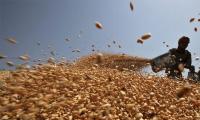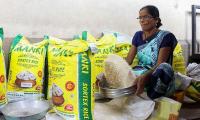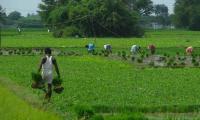Gene-Edited Embryos for Climate-Resilient Livestock: NDRI Breakthrough
NDRI aims to develop climate-resilient livestock through gene-edited embryos, tackling challenges like rising temperatures and fodder shortage. This breakthrough aims to boost milk production and support sustainable dairy farming.

Karnal, Sep 7 (PTI) National Dairy Research Institute (NDRI) is now set to implant a gene-edited embryo into a surrogate mother animal to develop climate-resilient livestock, according to its top official Dheer Singh.
This move aims to produce livestock better equipped to handle environmental stressors and support sustainable dairy farming amid climate change challenges, he told PTI in an interview.
NDRI has successfully modified embryos using gene editing technology, which has been documented in a scientific report recently.
"These gene-edited embryos will now be implanted into surrogate animals, marking a significant step towards developing livestock that can maintain productivity amid rising temperatures and other climate challenges," the NDRI Director said.
Singh further said livestock animals with higher milk production are often less climate resilient. Thus, NDRI is working on making high milk-producing animals climate resilient through gene editing, which will be beneficial for farmers.
By replacing non-climate resilient genes with those that are climate resilient, NDRI aims to develop animals that can better withstand climate challenges, he added.
Asked about the progress of artificial insemination, the NDRI Director said it is a well-established technology with no significant shortcomings.
"However, challenges remain in the availability of semen, trained personnel, and infrastructure," he said.
The government is working to improve the infrastructure and is developing cold storage systems for semen transportation. Cloning bulls to address semen shortages is also part of the strategy, he added.
Expressing concern over lower milk productivity per animal in India, Singh said NDRI is working to address this issue by developing cloning technology, which has shown success primarily with bulls, allowing for the multiplication of high-quality semen.
Due to religious sentiments, cows are not slaughtered, but buffaloes are. For cows, NDRI uses Ovum Pick-Up technology to rapidly multiply superior female germplasm. The goal is to increase the average milk production by focusing on breeding high-quality animals.
Expressing concern over fodder shortage, particularly during summer months, Singh said NDRI is exploring alternative solutions, such as converting local resources into fodder and using silage to address the shortage.
Silages are showing promising results and may become a more common fodder option in the future, he said, and suggested encouraging more entrepreneurs to scale up these technologies, and participating in government skilling programs and certificate courses can also help address fodder challenges.
The NDRI Director also advised farmers to leverage the extensive network of Krishi Vigyan Kendras (KVKs) under ICAR. Embracing and applying the latest technologies and advancements is crucial for improving livestock management and productivity, he added.
India is the world's largest milk producing country in the world.
This move aims to produce livestock better equipped to handle environmental stressors and support sustainable dairy farming amid climate change challenges, he told PTI in an interview.
NDRI has successfully modified embryos using gene editing technology, which has been documented in a scientific report recently.
"These gene-edited embryos will now be implanted into surrogate animals, marking a significant step towards developing livestock that can maintain productivity amid rising temperatures and other climate challenges," the NDRI Director said.
Singh further said livestock animals with higher milk production are often less climate resilient. Thus, NDRI is working on making high milk-producing animals climate resilient through gene editing, which will be beneficial for farmers.
By replacing non-climate resilient genes with those that are climate resilient, NDRI aims to develop animals that can better withstand climate challenges, he added.
Asked about the progress of artificial insemination, the NDRI Director said it is a well-established technology with no significant shortcomings.
"However, challenges remain in the availability of semen, trained personnel, and infrastructure," he said.
The government is working to improve the infrastructure and is developing cold storage systems for semen transportation. Cloning bulls to address semen shortages is also part of the strategy, he added.
Expressing concern over lower milk productivity per animal in India, Singh said NDRI is working to address this issue by developing cloning technology, which has shown success primarily with bulls, allowing for the multiplication of high-quality semen.
Due to religious sentiments, cows are not slaughtered, but buffaloes are. For cows, NDRI uses Ovum Pick-Up technology to rapidly multiply superior female germplasm. The goal is to increase the average milk production by focusing on breeding high-quality animals.
Expressing concern over fodder shortage, particularly during summer months, Singh said NDRI is exploring alternative solutions, such as converting local resources into fodder and using silage to address the shortage.
Silages are showing promising results and may become a more common fodder option in the future, he said, and suggested encouraging more entrepreneurs to scale up these technologies, and participating in government skilling programs and certificate courses can also help address fodder challenges.
The NDRI Director also advised farmers to leverage the extensive network of Krishi Vigyan Kendras (KVKs) under ICAR. Embracing and applying the latest technologies and advancements is crucial for improving livestock management and productivity, he added.
India is the world's largest milk producing country in the world.
You May Like To Read
TODAY'S MOST TRADED COMPANIES
- Company Name
- Price
- Volume
- Vodafone-Idea
- 11.36 ( -2.49)
- 94664837
- Vodafone-Idea
- 11.36 ( -2.49)
- 94664837
- AvanceTechnologies
- 1.16 (+ 4.50)
- 34522155
- AvanceTechnologies
- 1.16 (+ 4.50)
- 34522155
- Sunshine-Capital
- 0.26 ( -3.70)
- 29015901






